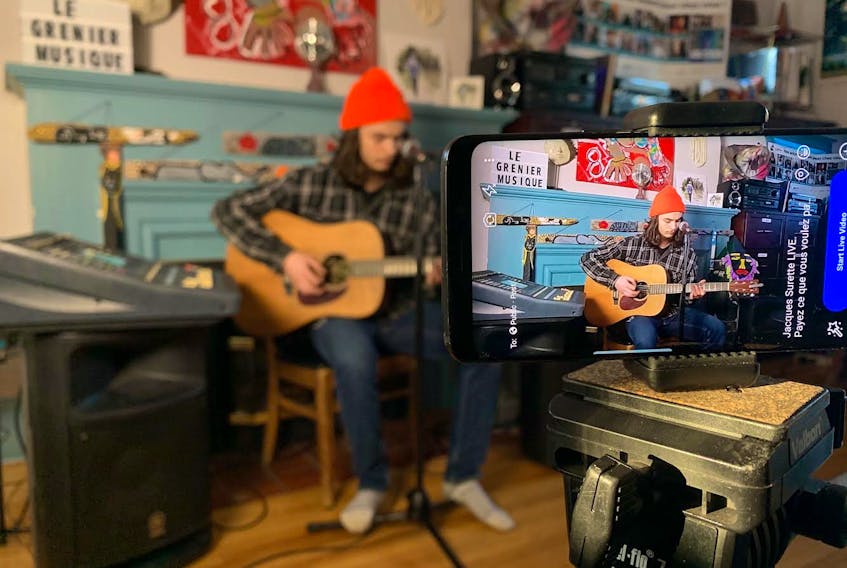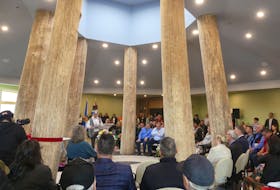A Moncton record label and agent for Atlantic Canadian musicians is upping its production of CDs, vinyl records and cassettes, and live-streaming concerts and workshops by professional musicians to survive the severe downturn in the industry.
“Zoom has been my best friend for the last six months,” says Carol Doucet, manager and owner of Le Grenier Musique.
“We’ve been doing workshops. If you want to play the guitar, a musician from Le Grenier Musique can show you how to do it.”
The cost to have a pro show you how to play an instrument works out to about $40 per hour per person, or about $200 for a group of up to 10 people.
The business has so far contracted to produce 11 workshops for the non-profit organization that runs the Monument-Lefebvre National Historic Site, a building in Memramcook that features a 400-seat theatre. Those are slated to be held in the spring.
Le Grenier Musique organizes concerts and other gigs and produces and promotes the music of the 16 Atlantic Canadian musicians in its stable.
These include Acadian icon Zachary Richard, rising stars Matt Boudreau, Émilie Landry and Chloé Breault, acclaimed Nova Scotia musician Jacques Surette, traditional Acadian folk group Seconde Nation and Prince Edward Island cultural ambassadors Lennie Gallant and Patricia Richard, known as Sirène et Matelot.
When the lockdowns shut all but essential businesses, musicians saw gigs evaporate as festivals were cancelled and bars, pubs and restaurants closed.
“There were about 250 shows that were cancelled for our 16 artists since March,” says Doucet.
“That includes shows on tours, in schools, in Atlantic Canada, Louisiana and in France.”
Even after things began to reopen, social distancing regulations still prevented in-person gigs from being held in a way that would be profitable.
“We work with younger artists and usually in smaller venues there are about 150 seats,” says Doucet.
“Now, there are only 25 seats. There’s no place for them to play.”
Without gigs, the sale of merchandise, including CDs, records and cassettes, plummeted.
Le Grenier Musique, which employs two full time and two more part-time workers, makes money by charging a commission of 10 to 15 per cent on income from the various revenue streams of the musicians it represents. That includes money from shows, tours, merchandise and grants.
COVID-19 has cost the label about 45 per cent of its revenue, and Doucet isn’t expecting things to be much better next year.
“This year, the artists should be fine but next year, if it doesn’t get any better, these artists will not be artists next year,” says Doucet.
“They will have to find other jobs. In Quebec, 57 per cent of artists are planning to quit.”
In her struggle to keep Le Grenier Musique and the musicians she represents afloat, Doucet is roughly doubling her record label’s production of CDs, records and cassettes.
“Usually, I produce three or four CDs every year and now it’s going to be six or seven.”
The label is also turning to the web to make up for the lack of in-person gigs.
Early in the pandemic, a lot of musicians turned to Facebook Live to perform and stay connected to their fans with free concerts. Many of these were done from the musicians’ living rooms. Landry did one and got $600 in donations.
But as the pandemic continued to take its toll, Doucet figured there was a pent-up demand for entertainment and turned to higher-quality, professionally recorded and live-streamed concerts and workshops.
“We bring TV crews, sound and lighting technicians, and we go into the theatre with no public present and we sell these shows to the festivals and people pay to watch them,” says Doucet.
“This is better than nothing.”
On Dec. 4, three of Le Grenier Musique’s artists will be promoting albums released this year with a show at the Centre des arts et de la culture de Dieppe. Fans will be able to attend in person or take it in over the web.
This year, Le Grenier Musique’s revenue included about $60,000 in commissions on grants for musicians and another roughly $60,000 in royalties from the sale of CDs, records and cassettes. The business has also snagged a $15,000 Canada Council for the Arts grant and another from Heritage Canada.
But Doucet says the business, which usually breaks even, is only holding its head above water this year with Ottawa’s relief, including a $40,000 interest-free Canada Emergency Business Account loan. Up to 25 per cent is forgiven, provided the borrower pays the balance by the end of 2022.
She intends to also apply for the $20,000 additional interest-free loan that will soon be available under that program. It forgives $10,000 of the loan if it is paid on time.
The Canada Emergency Wage Subsidy has also helped Le Grenier Musique meet payroll.
Confident her business will survive due to the abundance of up-and-coming artists and her move online concerts, Doucet is not as optimistic about the future of the music industry over the coming year.
“2021 will look a lot like 2020,” she says.
“In the music industry, summer is when the artists make their money because that’s when all the festivals are held.
“This can’t go on much longer. It’s not easy. We’re getting by now but we won’t get by much longer.”
The Pivot is a regular feature about an Atlantic Canadian company adapting to new market realities with innovative products, services or strategies. To suggest a business, email: [email protected].









